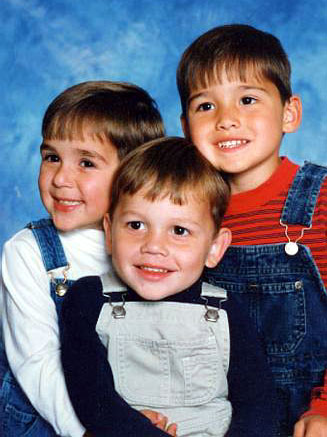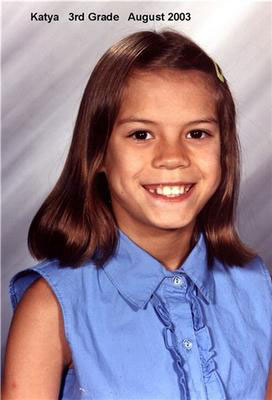|
#2, December 14, 2004
TATAR, BASHKIR, CHUVASH KIDS IN AMERICA The American Internet has many sites regarding foreign children adopted by American families. There are over 1,500 sites where parents discuss the issues of adopting and bringing up foreign-born children. The largest of these sites is for parents that have adopted from China, with 4,750 members. Most of America's international adoptions are from China. The largest site for parents of children adopted from Russia has 3,856 members. There are also sites on issues of adopting children from other countries: Korea, Guatemala, Mexico, Columbia, India, Romania etc. Among the American sites there is a list for families
of children adopted from the three biggest Turkic nations in Russia, i.e.
Tatars, Bashkirs and Chuvashes. The site's name is TBCKids (Tatar Bashkir Chuvash Kids) Àäðåñ â Èíòåðíåòå: http://groups.yahoo.com/group/TBCKids/ The site is described as a list for families who have adopted children from Russia with ethnic Tatar, ethnic Bashkir or ethnic Chuvash roots. Editor's note Jamila had originally written the following article back in August 2003. Because our newspaper is rarely published, there was not enough space to print the article until late 2004. Better late than never, though. Moreover, the article is relevant because the issue of Russian children adopted by foreigners is recently very popular in the Russian mass-media. Jamila BIKKININA In the past few years, more and more children from Russian orphanages (children's homes) are being adopted by mothers and fathers from other countries, mostly the United States. According to the US Embassy in Moscow, about 4500 Russian children go to the US every year. American families adopt children from other countries also, but mostly from Russia and China. It's well-known that Tatars do not usually hand over their ill children or disabled and old people to the state. So, the children's homes in Mordovia don't have a single Tatar child. But it turns out that among the children brought to the US from other regions of Russia, there are Tatar, Bashkir and Chuvash children. American adoptive parents are paying more and more attention to the ethnic origin of their children from Russia. This is important as the child grows up, for now he can proudly talk about his biologic origin saying, "I'm a Russian (Tatar, Mordovian) an American of Russian (Tatar, Mordovian) origin". So, where do Americans get information on the various ethnic groups in Russia? From the internet, of course. Since the very moment the internet-version of our newspaper started in 1999, adoptive parents have been contacting our desk for advice on things such as the ethnic features of Tatars and Bashkirs, their culture, national garment and cuisine. In October of 2001, one of these American parents, Christine from Seattle, designed a special site for families who have adopted Tatar, Bashkir and Chuvash children. Christine has three kids from Bashkortostan in her family: 6-years-old Albert from Ufa (Tatar), Artur (half Tatar, half Bashkir) and Alesha (half Chuvash, half Russian) both 4-years-old.
Christine's adopted children (from left to right): Artur (half Tatar, half Bashkir), Alesha (half Chuvash, half Russian), Albert (Tatar). Here's what Christine writes: "While my children are still small at this time, nonetheless, I am actively trying to find information about their heritage and culture for their future knowledge. It is difficult at best to find anything written in English on anything other than Russian culture, and yet I fully understand how unique, independent and proud these peoples are. Most of my limited knowledge and few photos come from a short visit to the wonderful though small Museum of Tatar and Bashkir Culture in Ufa". Christine thanks also Tatar web sites, especially the site of the Tatar Gazette, where there are many articles written in English which are useful for adoptive parents. Christine's web site gives American parents a place to write about their Russian-born children, about what they do in their leisure time, their behavior, how good they are, their illnesses and the treatments. Yes, the Russian proverb saying 'the real mother is the one that brought up the child, not the one who gave birth to him/her' is very right. The mother that has given birth to a child and the mother that is bringing up this child, taking care of him/her (even if he/she's adopted) are very different. At this TBC site the families share the photos of their children and can get to know from each other what their children's names mean. They share recipes of Tatar, Bashkir and Chuvash cuisines. It is very difficult for Americans to find that sort of information on their own. Tatar families living in Russia, US, Japan, Turkey and Australia answer different questions and give advice on many issues. The most active among them are the families of Airat and Lilia Shammasovs from Arizona, Rustam Yumash from Australia, Rushan Bichuri from Turkey. Some say that if you adopt a child when they are very little, he/she will be easier to bring up. But there are Americans adopting children who are almost teenagers. The Thompson family has 10 children. Among them there are 6 children from Russia. The last child, Chuvash Katya, was adopted from Cheboksary. Katya was adopted when she was 11, but despite her age at adoption she's already speaking English along with Russian and Chuvash. Now Katya has a new name - Valeria.
A woman named Beth from Strongswill, Ohio has also adopted a child from Russia. In 1997 she adopted a 16 month-old Tatar child from Magnitogorsk. His name is now Alex and he's 8-years old. Alex goes to school, is in good health and he does very well. His adoptive parents want Alex to know more about the Tatar nation, culture and history. So how do the Americans adopt little Tatars, Bashkirs and Chuvashes? A woman named Joanna answered this question. Here are some extracts from her letter: "My name is Johanna and my husband Charlie and I have a now almost-four year old little boy who is Tatar. Arthur was born in Kazan and came home in August of 1999. He was 14 pounds at 17 months at that time and is now a whopping 37 pounds and 39 inches tall. He also talks a blue streak (after being speech delayed) and has a tremendous vocabulary. Arthur is very bright and has the most wonderful disposition a child could have (except when he is battling with his "new" brother Sergey who has been home since January, is 10 months younger, a lot smaller, and "Russian"). (Sergey was adopted from an orphanage in Novokuznetsk, Siberia, in October of 2001. - Editor's note). …When we were in court in Kazan, there was a great deal of discussion about whether Arthur was Tatar or Russian. They looked at the picture of the dark haired, dark eyed baby and determined that he was Tatar. When we got his paperwork, it stated that both his birthparents were Tatar, so there was no more guesswork involved. I wouldn't have known the difference at the time, so it wouldn't have made any difference, but I'll tell anyone that I'd adopt another Tatar child in a second. …Arthur's home was Kazan Orphanage #2. The workers were all very well intentioned, but they had the barest of facilities for the children. The children were not encouraged to walk or given much physical activity. Arthur was very sickly and weak, much to my shock, as his videos at 2 months prior to our being there showed a small but relatively well developing child. He did not walk and barely made any noises. The first time I heard him cry was after we'd had him a few days and I put him down. From that point on I literally held him for the next three months. The children do not have the proper medicines or vitamins and the hypodermic needles used are of the older variety, not disposable, and he had a few good holes on his thigh. The doctor at the American Medical Center looked at him and said, "You have a starving child". I'll never forget it. But through it all, that starving child had a smile on his face and a spark in his eyes and I loved him with my whole soul immediately. It's like we knew we belonged to each other then and we still have a very unusual relationship today. As much as I love Sergey too, Arthur is my heart. I don't know if it is because he was my first, I tend to think it's this cosmic thing, and I'm not one to think that way. Or wasn't. … I wouldn't have known one orphanage from the next, but having seen the one my other son was in, I now know how poor Arthur's was. …When we were there [in Kazan], two judges were presiding, one male, one female. Court is taken very seriously in Kazan, and the prosecuting attorney will question you as well. We were fortunate to have the woman judge, who although serious, knew that we wanted this child and did not give us a hard time. The couple that we traveled with had the male judge who gave them such a bad time that they both came out shaking. So did the translator. He granted them the adoption but not before he knocked down everything they said." These American families will bring up new Americans from little Tatars, Bashkirs and Chuvashes. Despite the fact that they will be Americans, they will never forget their origin thanks to the efforts of their new mothers and fathers.
© «THE
TATAR GAZETTE» |

